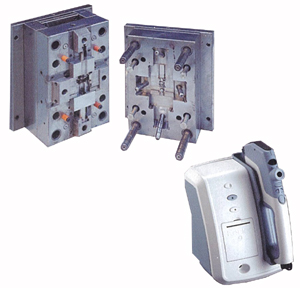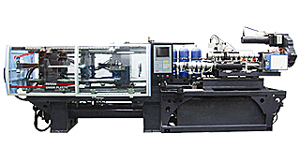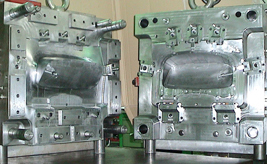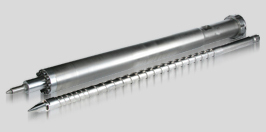Taiwan's Plastic Injection Firms Prosper With the IT Industry
2012/01/16 | By Ken LiuTaiwan's plastic injection industry has matured and grown strong over the 30 years or so since its inception, building up a strong manufacturing ecosystem that covers almost all sectors of the industry from molds and components to machines and injected parts.

Along with its wide coverage the industry has also achieved extraordinary precision, with an average tolerance error of a tiny fraction of a millimeter, in response to the requirements of the information-technology and telecommunications-equipment industries. Also, the island's manufacturers have developed machines in line with the trend toward eco-friendliness.
One of the leading Taiwanese suppliers in the line is the Song Mark Enterprise Co., founded in 1979, as an OEM/ODM (original equipment/design manufacturer) specializing in plastic injection molds and plastic injection processing. The company turns out products mainly for manufacturers in the electronics, medical-equipment, security-system, telecommunications-equipment, industrial-equipment, and home appliance industries.
Over the past few years, Song Mark has transformed itself from a pure manufacturer into a manufacturing service company that provides design services, the fixing of design defects, and the assembly of individual injected parts into semi-finished or finished products—a kind of operation which is more complicated than making single parts. “A semi-finished or finished piece usually contains our own parts and other parts that are outsourced,” explains the company's president, Y.S. Wu. “The difficulty in this is making sure that the outsourced parts have as high a quality as our own.”
The company's services also include stamping, machining, casting, extrusion, coating, plating, painting, and even printing.
Design services and the fixing of design defects are done mostly by the company's tooling R&D department, which provides customers with design analysis, moldflow analysis, mold design, and materials selection. The unit has been outfitted with 10 computers and design tools including an Auto CAD R14, Export CAD CAM, and Pro/Engineer. The firm's well-trained specialists use these tools to confine tolerance error within 0.01 millimeter.

Currently, the company makes over 4,000 types of single parts in-house. To assure quality, each part is assigned an identification code carrying a string of specifications covering material content to packaging. Each part usually requires several processing steps, with complicated parts needing as many as 27.
“We manage the identification data with computers and confirm them against physical products daily, before producing them,” Wu says. Every morning, QC engineers check the first pieces coming from the company's 15 injection machines against their data.
Computers and Inspections
Song Mark conducts on-line inspection twice in accordance with ISO standards, and one last time before delivery. The company holds ISO9001:2000 and ISO14001 certifications, and most of the parts it produces are RoHS compliant.
The firm now operates a 30,000-sq.-ft. plant with 50 employees in Taiwan as well as a joint venture in mainland China, set up in 1996 and having a workforce of 250.The factories are equipped with a variety of injection machines having injection forces of 50 tons to 1,350 tons, 15 ultrasonic welders rated from 1,800 watts to 3,200 watts for assembly and inspection purposes, and a number of inspection systems. In addition, its tooling units in Taiwan and the mainland operate 12 milling machines (four computerized), two CNC electric discharge machines (EDMs), five manual EDMs, two high-speed lathes, two grinders, four adjustable-arm drilling machines, three knife-edge forming machines, and three machining centers.
Energy saving technology is featured in the plastic injection machines made by the Taiwan Union Plastic Machinery Co., founded in 1984. The company began developing variable-frequency technology for the machines in 2002 with the aim of achieving an average electricity saving of 30%, but going up to a maximum of 70%. It succeeded in its aim and won seven patents in Taiwan, mainland China, the United States, and South Korea in 2004.
“We've noticed that ecological friendliness has emerged as a trend in the plastic injection machinery industry, and we have been sparing no effort to develop machines that meet that trend,” stresses the company's chairman, S.T. Lu.
In 2007 the company unveiled machines noted not only for their energy efficiency but also for low noise, making them friendlier than their predecessors. According to Lu, his machines are equipped with a servo unit that automatically reins in power consumption as soon as an excess flow is detected. “Equipment operators need not re-enter injection commands in response to changes in power flow, nor will they see any increase in defect rate,” Lu explains. “These machines are highly recommended by our customers in Europe, Asia, the Americas, and the Middle East for the benefits they bring.”
Taiwan Union builds its “double-friendly” technology mostly into machines with 1,000 tons to 3,600 tons of injection force because, Lu says, “servomechanism technologies for mid- and large-sized injection machines are costly because of their higher technological sophistication.”
One of the company's star products is an optical-grade hybrid injection molding machine featuring low noise and low power consumption. An isolated hydraulic driving unit ensures low noise when the machine is working; and it works swiftly, thanks to lighter moving parts that produce less inertial force. Sensors on tie bars ensure accurate movement and clamping stability.
Eco-friendly Foam Molding
Microcellular foam molding technology is another of the company's friendly machine solutions. The technology, mostly used to produce thermoplastic parts, saves on plastic materials since the parts made with it have a foamed instead of solid structure, while remaining as hard as a solid structure. “We develop technology in line with the worldwide trend toward making products with less plastic materials,” Lu comments. A patented gas-compression design ensures the instant, even mixture of nitrogen or carbon dioxide, which are added as blowing agents, with plastic materials in the machines to facilitate injection.

The company's product line also includes two-color injection molding machines, high-speed injection molding machines, modular injection molding machines, microprocessor injection molding machines, and shoe-last injection molding machines.
Its high-speed injection molding machine processes two meters of workpiece per second. Other features include a patented two-stage injection system and a patented positioning control system, which ensure injection quality. A rigid frame, rigid linear structure of clamping molds, and four-point toggle clamping system considerably reduce vibration during injection.
Taiwan Union's modular injection molding machine is noted for its “transformer” feature: Its modular clamping system, injection system, hydraulic system, and electrical system can be assembled into different models to meet customer needs in terms of structure, precision, specifications, and injection speed.
The company has built up a strong R&D capability through cooperation with academic institutions such as the National Kaohsiung University of Science and Technology, in Taiwan, and Zhejiang University, in mainland China, as well as with other high-tech companies in Taiwan and the mainland.
“Our strong R&D capability allows us to build a seamless combination of electronics and mechanics into our machinery,” Lu says. “We may not be Taiwan's pioneer in plastic injection technology, but we are surely a plastic-injection equipment supplier that can provide total solutions to meet customer needs.” The company's R&D team is equipped with advanced 3D computerized design programs and an army of plastic-injection veterans.
In recent years, Taiwan Union has expanded its reach and customer base in mainland China by opening four factories there, three in Hangzhou and one in Shenzhen. These factories, together with a factory in Taiwan and another in Thailand, turn out a total of 1,000-some machines a year.
Lu points out that mainland China's market for plastic-injection machines has been developing briskly in recent years, thanks mostly to the mainland's rapidly growing economy and its increasingly strict environmental-protection regulations. For this reason, Lu reports, “Our sales of eco-friendly machines in the mainland continued to grow even during the 2008-2009 global economic downturn, when markets for plastic-injection machines in other countries were contracting.”
Room to Grow
“There is still ample room for growth in sales of injection machines,” Lu comments. “The crux is whether you can develop eco-friendly machines or not.” Thanks to efforts made over the past few years, the company has won TUV ISO9002 and CE approval.
The Wangbai Steel Mold Co. manufactures plastic injection molds including bi-color molds, hot runners, gas assist molds, and thin wall products for parts used in cars, office supplies, mobile phones, computers, and digital appliances, among other products.
Founded only in 2003, Wangbai has won ISO9001 TUV certification and is staffed with design and manufacturing engineers with more than 20 years' experience in the industry. The company's capabilities include mold design and tooling as well as the provision of design advice to customers, and its molds can be used for everything from precision gear parts to auto parts that require four-ton molds to produce. Most of the company's molds are made to HASCO, DME, and FUTABA standards, which are widely adopted in the global plastic-injection industry.
When they design molds, the top two concerns for the company's R&D engineers are water-cooling and gas-outlet systems, which are responsible for how quick cooling and gas discharge can be carried out. The quicker this happens, the shorter the time needed for making molds.
Over the years, Wangbai has invested heavily in advanced production and inspection equipment with the aim of strengthening production efficiency and cutting production costs.Its production lines are equipped with Makino numerical control electrical discharge machines, Technomagnete electro permanent magnetic systems, high-speed CNC machining centers, Herzog grand eagle shrink units, Erowa tooling systems, CNC powder resin EDMs with Erowa electrode automatic switching systems, Cimatron E7.0 CAD/CAM systems, Hitachiair compressors, HP WorkStation XW6200s, HP Design Jet 750C Plus A0 Plotters, optical measuring instruments, sawing machines, surface grinders, tapping machines, and radial drilling machines.

The company makes its mold systems out of through-hardened steels including STAVAX ESR-S136, M333ESR, H-13, and 2344, or pre-hardened steels such as 718S, 718H, NAK 80, P20, P20HH, and 2311. Its mold base is made of S55C, 1730, or P1, and the molds come with steel certificates and ISO9001 TUV approval. Europe, North America, South Korea, and Japan are the company's major export markets.
Wangbai has worked hard ever since the beginning to boost its production value. When processing molds, the company provides its customers with progress reports, including pictures, every week. When completed, the molds go to customers with their final 2D and 3D layouts.
The Lung Chang Machinery Enterprise Co. is a professional maker of extruder screws and barrels, injection screws and barrels, and extruder gearboxes. Its extrusion and injection screws and barrels are made of high-grade special steel to ensure excellent quality and increased productivity, and the thread is especially processed and coated with a nickel-based alloy. The result is a hardened surface with two or three times more wear-resistant than conventional threaded rods.
The Value of Experience
Huang Jen-chiang, Lung Chang's chairman, claims that his company's products feature improved performance, greater efficiency, and longer service life than other products, thanks mostly to a number of major initiatives that were inaugurated in 1994. “Those initiatives,” the chairman reports, “included the establishment of a mechanical department, completion of the integration of our operational process from design up, and mapping out of plans to manufacture and export in a bid to provide customers worldwide with the best products and the most efficient services.”
Huang stresses that experience plays a vital role in precision-screw manufacturing, especially when it comes to controlling processing methods, processing steps, and mechanical stress relief. “The crucial point of all this is to control the total deformation of the screws,” he says, “and that requires abundant experience.”
Huang notes that after more than 30 years of development, Taiwan's plastic-processing equipment industry is mature. “Most of the key components for our machines are now domestically made, and their quality is very close to that of American, German, and Japanese components,” he insists. “The high quality of domestically made screws is especially significant, because it represents our lead over mainland Chinese and South Korean manufacturers, which are known for substandard machines.”
His company, Huang says, develops screws and barrels using the latest design concepts and manufactures them with special alloys that enable the workpieces to withstand erosion as well as wear and tear with a hardened surface rating 62 to 65 in the HRC grade.
Lung Chang also makes blow-mold bag machines, deep-hole processing machines, and blow machines for the high-speed production of films and similar bulky plastics.The company has a comprehensive product line and is capable of supplying whole-plant systems, and offers technical support to help its customers in Taiwan and overseas solve whatever problems they may encounter.




